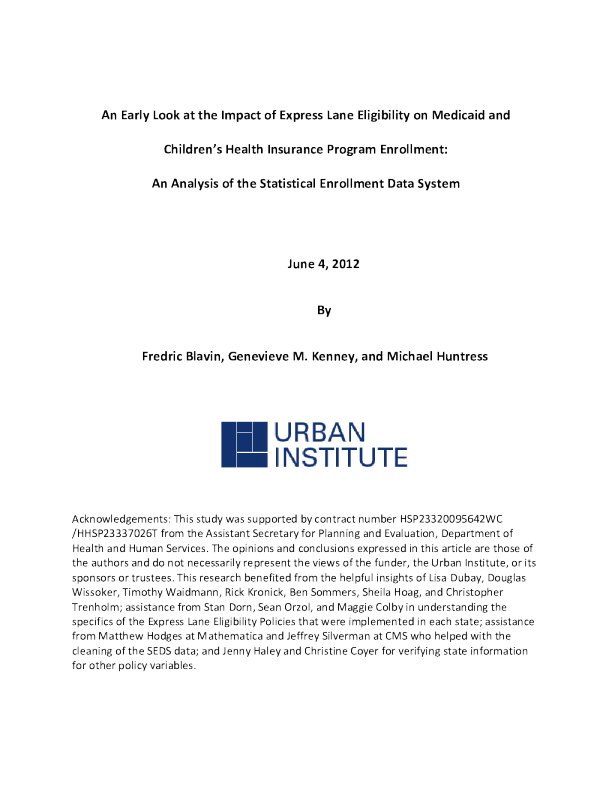The Medicaid DSH Program and Providing Health Care Services to the Uninsured: A Look at Five Programs

The Medicaid DSH Program And Providing Health Care Services to the Uninsured: A Look at Five Programs March 2001 The Health Policy Center The Urban Institute 2100 M Street, NW Washington, DC 20037 This project was funded by the U.S. Department of Health and Human Services, Office of the Assistant Secretary of Planning and Evaluation, Contract No. HHS-100-97-0010, Task Order 12. This report was co-authored by Teresa Coughlin, Stuart Guterman, Brian Bruen and Amy Lutzky. The views expressed are those of the authors and should not be attributed to The Urban Institute, its trustees, or its funders. iAcknowledgements We gratefully acknowledge the participation of the many program staff and state officials who shared their time and insights. This study would not have been possible without them. A list of people we interviewed is provided in Appendix B. We also thank our ASPE Project Officer, George Greenberg, for his help and advice throughout the project. iiExecutive Summary Perhaps the most important health policy issue facing the United States is how to care for the uninsured. In 1999, 42 million people had no health coverage, more than one out of every six Americans under age 65. Uninsured individuals often lack access to appropriate care, but they still use health services when they become ill and, in many cases, they do not have the financial resources to fully pay for their care. Hospitals, in particular, serve as providers of last resort for the uninsured. Through various public programs—local, state, and federal—many hospitals receive subsidies to help pay for the costs associated with uncompensated care. One of the largest subsidy programs is the Medicaid disproportionate share hospital (DSH) program. Medicaid DSH represents an important funding source for hospitals in their efforts to care for the uninsured in the communities that they serve. This study provides some insights on the experiences of five programs that have used Medicaid DSH funds to enhance care for the uninsured. We examined five current programs located in Denver County (Denver), Colorado; Marion County (Indianapolis), Indiana; Ingham County (Lansing), Michigan; Wayne County (Detroit), Michigan; and Bexar County (San Antonio), Texas. These programs were chosen, in part, to reflect a diverse set of design choices with regard to target population, organization, financing, delivery system, and services provided. It was also important that they all appeared to be sustainable over the long term. Finally, an attempt also was made to include programs that represent a variety of economic and other environmental conditions. This study, which was financed by the United States Department of Health and Human Services, was intended to provide background information for the Community Access Program, a major department initiative designed to provide grants to localities to improve health care access for the uninsured. LESSONS LEARNED While each program is unique and faces its own set of circumstances, there are several lessons that can be learned from the study programs which can guide other communities as they look to find local solutions to the growing problem of caring for the uninsured. Understand all of the financing options. Medicaid DSH can be a critical financing component of local health care safety nets. Indeed, without DSH, some of the programs we studied would not be financially viable. However, DSH was never the sole funding source for the programs. Instead, study communities relied on a combination of funding streams. Local leaders will need to assess how to structure program financing that is in keeping with available resources. Build political support. Political support is critical to both the development and sustainability of the program. Without exception, program administrators stressed the importance of securing local and, sometimes state, support of policymakers in developing an initiative. Having solid political backing is central to gaining and keeping program financial support and ensuring long-term success. Use existing programs as a starting point. Communities should examine existing indigent care programs as a starting point for creating a new program. All of the study sites iiibegan the development of the new initiative with a pre-existing health care program or programs. In some cases, the local community simply revamped an existing program. By contrast, in other communities a broader policy change brought about a fundamental restructuring of an existing program. Start with primary care. If a comprehensive system of care is not initially feasible, localities should start with a limited set of services. A good first step is to start with primary care and drugs. Then add specialist care, followed by inpatient care. By starting with primary care, a program can cover more people with the same amount of money which allows the program to build momentum and community




